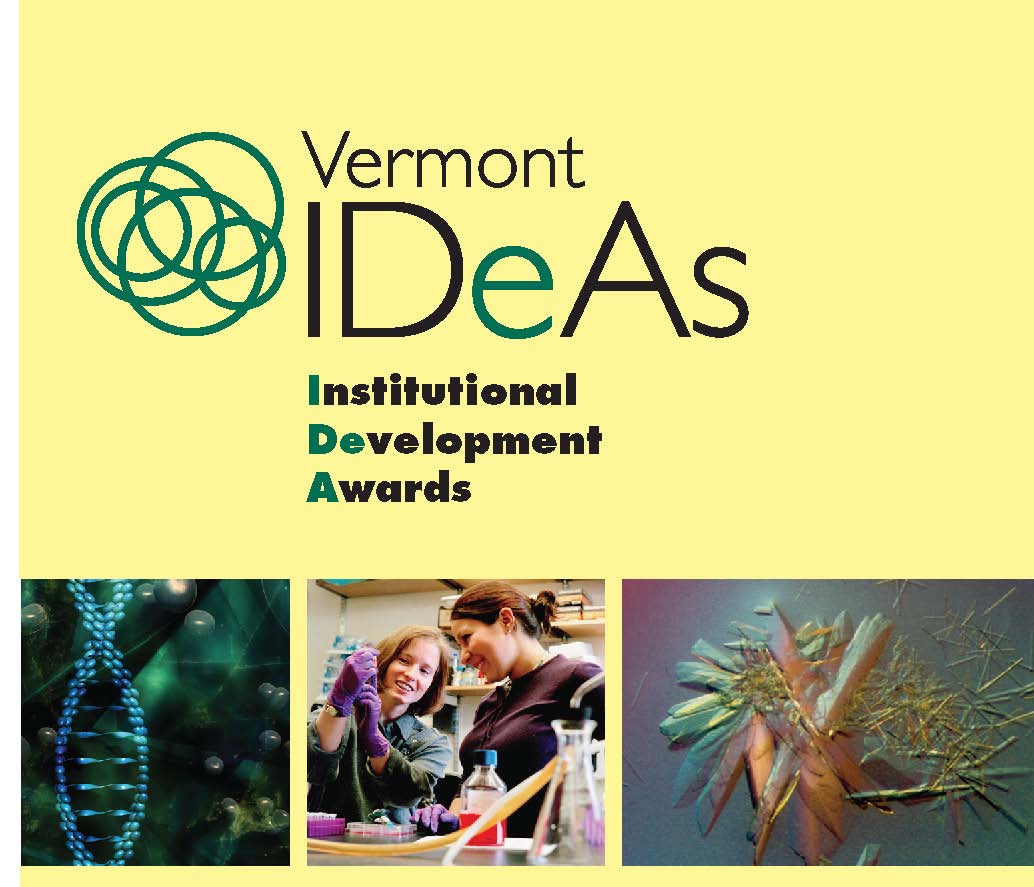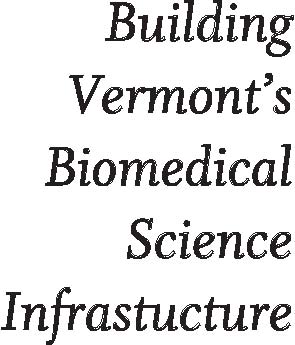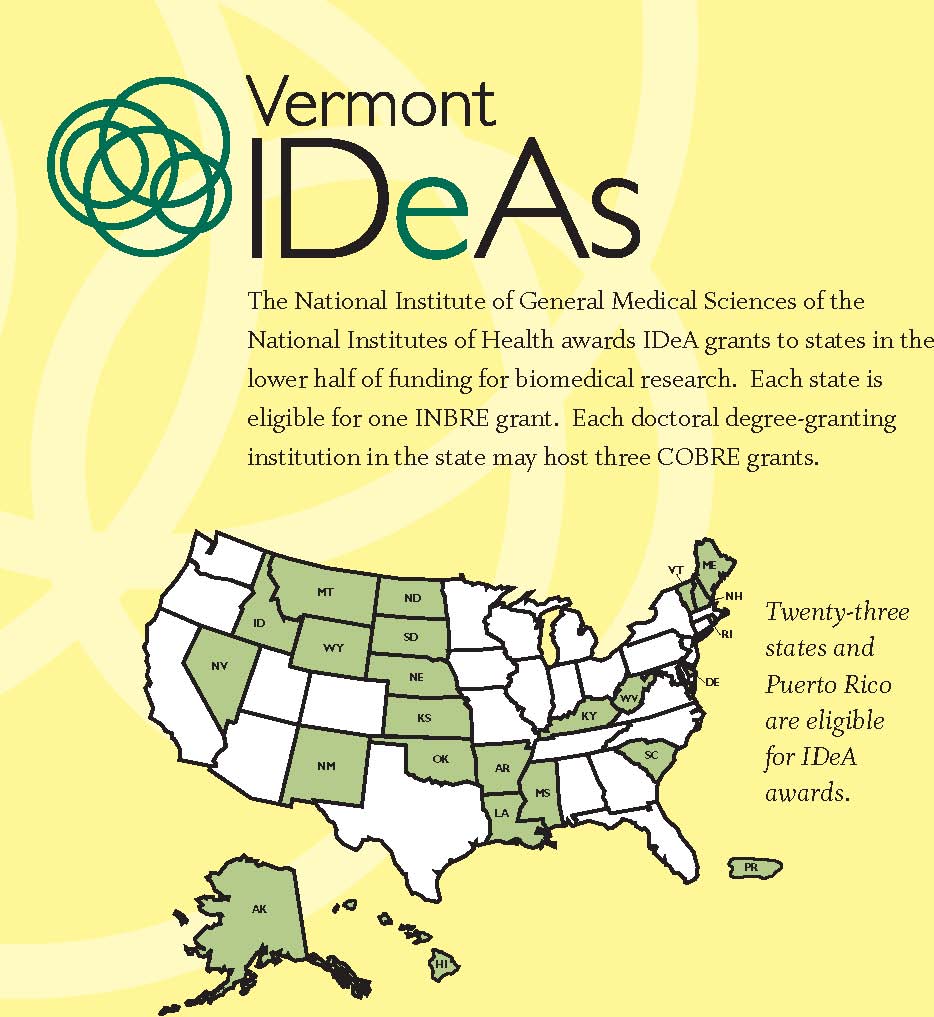

 |  |
 |

|

The Vermont Genetics Network (VGN) is in its second phase of funding with a five-year $16.5 million award from the IDeA Networks of Biomedical Research Excellence (INBRE) program of the National Institute of General Medical Sciences at the National Institutes of Health. The mission of VGN is to build human and physical infrastructure in Vermont for biomedical research. At the lead institution, the University of Vermont (UVM), we have developed state-of-the-art facilities for Microarray and Proteomics to provide to researchers across Vermont the resources they need to carry out world class research and compete for federal funding. To address workforce development and its diversity, we build cultures of research by supporting faculty and student research at our Baccalaureate Partner Institutions (BPIs): Castleton, Johnson and Lyndon State Colleges, Middlebury College, Norwich University, Saint Michael's College and Green Mountain College. We also work with students in college lab classes throughout Vermont in order to bring state-of-the-art research resources into their education.
VGN impacts STEM employment in Vermont by supporting faculty and staff members at UVM and BPIs: 5 full time faculty at UVM and Norwich University, 3 part time faculty at UVM and 21 at BPIs, and 9 full time staff at UVM and Norwich University. Since 2005 VGN has funded 20 graduate students, 92 project awards to BPI faculty members, 53 pilot project awards to BPI faculty members, 79 student summer research awards to BPI undergraduate students and use of facility awards to 12 UVM faculty members. Our students’ careers in medicine, biomedical research and STEM teaching have been influenced by opportunities made possible by VGN. 87% of our students go on to STEM careers. The principal investigator is Judith Van Houten, PhD (Judith.Vanhouten@uvm.edu). To learn more, visit: https://vgn.uvm.edu/
Lung disease is a significant cause of mortality and especially morbidity in the U.S. While the other six leading causes of death have decreased over the last decade, all forms of lung disease continue to rise. If we are to make significant progress in combating this pressing health problem, we will need to have trained scientists and resources to study the causes and cures of lung disease. The Vermont Lung Center (VLC), a Program on Lung Biology and Disease, has been in existence at the UVM College of Medicine since 1972. It has had a rich and productive past that has a significant impact nationally. The keystone to the VLC program is translational research. The goals of the VLC are to investigate the mechanisms of lung biology and disease, and to program and retain outstanding translational research at UVM. Our key product is excellence.
The current program centers around a 5 year award from the IDeA program of the National Institute of General Medical Science of the NIH. The VLC is a Center of Biomedical Research Excellent (COBRE). The goals of the VLC- COBRE are to: train and mentor a group of talented MD and PhD biomedical investigators, provide career development and guidance with skilled mentoring, and create a stimulating, supportive, and cutting edge research milieu. There have been 44 new hires since 2002 and there are currently 74 people employed at the Vermont Lung Center as of 2012. The principal investigator is Charles Irvin, PhD (Charles.Irvin@uvm.edu). To learn more, visit: https://www.med.uvm.edu/vermontlung

The Vermont Center for Immunology and Infectious Diseases (VCIID) is designed to integrate the studies of immunology and infectious disease since the primary function of the immune system is a defense against infection. Microorganisms interact with two fundamental components of the immune system, the evolutionary older innate immune system using largely invariant nonpolymorphic receptors, and the newer adaptive immune system that uses highly polymorphic receptors. Center investigators are examining genes that regulate the pathogenicity of infectious organisms as well as how the immune system responds to these agents. Some of the findings will lead to better vaccine development.
The goals of the VCIID COBRE are to build a robust and vibrant center that supports and mentors talented young faculty, recruits additional faculty, provides a dynamic seminar series, and expands core facilities in proteomics and microarray. The Center also provides support for students, postdoctoral fellows, and retreats. A special emphasis is placed on promoting an atmosphere that fosters stimulating discussions between basic and clinical scientists. These interactions will also include the state health department in an effort to directly improve the health of Vermonters. The VCIID COBRE program centers around a 5-year award from the IDeA program of the National Institute of General Medical Science of the NIH. The principal investigator is Dr. Ralph Budd (Ralph.Budd@uvm.edu). To learn more, visit: https://www.med.uvm.edu/vciid/

The primary goal of the Center of Biomedical Research Excellence (COBRE) in Neuroscience, created in 2001 by a grant from the NIH National Center of Research Resources, is to enhance Neuroscience research and training infrastructure across multiple colleges at the University of Vermont. Two sophisticated multi-user research cores: an Imaging/Physiology Core, which provides access to sophisticated imaging equipment dedicated to live imaging and a Cell/Molecular Core, which provides personnel and access to sophisticated equipment required to complete cellular and molecular biology experiments, are supported by COBRE funding. These multi-user facilities are a critical, unique resource for faculty, postdoctoral trainees, residents, and graduate, medical and undergraduate students. Multiple multi-year research projects and one-year pilot projects for junior investigators were funded in the first 10 years of the award.
The current transitional COBRE grant, which was awarded for 5 years in 2011, continues to support the shared research cores and funds one-year pilot projects in the areas of stroke and neurovascular interactions or neural regulation of autonomic nervous system development, function and disorders. A recent highlight for the Neuroscience COBRE was the award of a $600,000 NIH Shared Instrument grant to obtain a second Multi- photon Microscope to be housed in the Imaging Core. In sum, the Neuroscience COBRE-supports research cores that broaden faculty research capabilities and access to these core facilities has significantly increased the competitiveness of neuroscience faculty for extramural funding. The Neuroscience COBRE program centers around a 5-year award from the IDeA program of the National Institute of General Medical Science of the NIH. The Principal Investigator is Rodney L. Parsons, PhD (Rodney.Parsons@uvm.edu). To learn more, visit: https://www.uvm.edu/neuroscience/

For additional information contact: | |
| Vermont Genetics Network University of Vermont 120A Marsh Life Science Building Burlington, VT 05405 | Email: vgn@uvm.edu Telephone: 802-656-4087 Fax: 802-656-2914 Revised June 2014 |